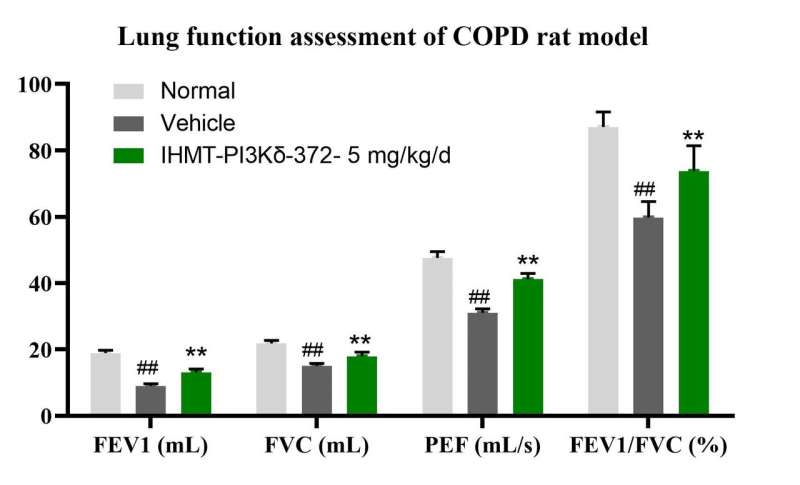In vivo efficacy evaluation of IHMT-PI3Kδ-372 in a lung inflammation rodent model. Credit: LI Feng
Recently, a research team led by Profs. Liu Qingsong and Liu Jing from the Institute of Health & Medical Technology of the Hefei Institutes of Physical Science (HFIPS) discovered a potent and selective PI3Kδ inhibitor IHMT-PI3Kδ-372, effective against chronic obstructive pulmonary disease (COPD) in vivo.
COPD is a chronic progressive respiratory disease characterized by airflow limitation and associated with abnormal inflammatory response of the lung. In recently years, it is becoming a major health problem and the third cause of death worldwide. Although oral administration of PI3Kδ inhibitor is reported to exhibit adverse effects as an anti-cancer drug in the clinic, inhaled drug delivery for respiratory disease may result in a potential reduction or avoidance of systemic side effects by delivering drugs directly to the site of action.
In this study, the researchers adopted a fragment hybridization strategy and discovered a novel PI3Kδ inhibitor IHMT-PI3Kδ-372 through medicinal chemistry exploration.
The compound showed high potency against PI3Kδ, and meanwhile exhibited high selectivity over other class I PI3Ks as well as a low risk of hERG-mediated cardiac toxicity. Notably, it displayed favorable pharmacokinetic properties for inhaled delivery and improved lung function in a rodent model of pulmonary inflammation.
These results suggest that IHMT-PI3Kδ-372 might be a new potential therapeutic candidate for COPD.
More information: Feng Li et al. Discovery of (S)-2-(1-(4-Amino-3-(3-fluoro-4-methoxyphenyl)-1H-pyrazolo[3,4-d]pyrimidin-1-yl)propyl)-3-cyclopropyl-5-fluoroquinazolin-4(3H)-one (IHMT-PI3Kδ-372) as a Potent and Selective PI3Kδ Inhibitor for the Treatment of Chronic Obstructive Pulmonary Disease, Journal of Medicinal Chemistry (2020). DOI: 10.1021/acs.jmedchem.0c01544
Journal information: Journal of Medicinal Chemistry
Provided by Chinese Academy of Sciences
























